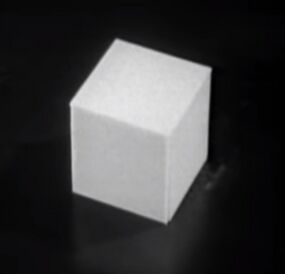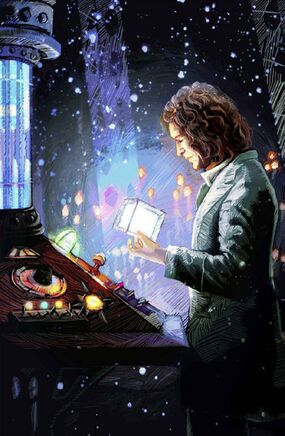Hypercube: Difference between revisions
66 Seconds (talk | contribs) No edit summary Tag: sourceedit |
No edit summary Tag: sourceedit |
||
| Line 1: | Line 1: | ||
{{Infobox Object | {{Infobox Object | ||
| | |image = Corsair cube (TDW).jpg | ||
|type=Message | |type = Message | ||
|first=The War Games (TV story) | |first = The War Games (TV story) | ||
| | |appearances = {{il|[[TV]]: ''[[The Doctor's Wife (TV story)|The Doctor's Wife]]''|[[PROSE]]: ''[[Ghost of Christmas Past (short story)|Ghost of Christmas Past]]''}} | ||
|clip=The Doctor Summons the Time Lords - The War Games - Doctor Who - BBC | |made by = [[Time Lord]]s | ||
|clip2=DOCTOR WHO CLIP 9 2 | |used by = [[Time Lord]]s | ||
|clip = The Doctor Summons the Time Lords - The War Games - Doctor Who - BBC | |||
|clip2 = DOCTOR WHO CLIP 9 2 | |||
}} | }} | ||
'''Hypercubes''', also known as '''tesseracts''', were a [[Time Lord]] form of communication. Physically resembling white cubes, they were able to store a Time Lord's thoughts or speech and could be sent through [[time]] and [[space]]. They could be used by [[human]]s as well as Time Lords. ([[PROSE]]: ''[[Vampire Science]]'', ''[[The Ancestor Cell]]'') They were theoretically impossible to intercept, but a [[Boy (Unnatural History)|member]] of [[Faction Paradox]] intercepted a cube the [[Eighth Doctor]] sent to the Time Lords. They were mainly owned by members of official [[Gallifrey]]an organisations. ([[PROSE]]: ''[[Unnatural History (novel)|Unnatural History]]'') | '''Hypercubes''', also known as '''tesseracts''', were a [[Time Lord]] form of communication. Physically resembling white cubes, they were able to store a Time Lord's thoughts or speech and could be sent through [[time]] and [[space]]. They could be used by [[human]]s as well as Time Lords. ([[PROSE]]: ''[[Vampire Science]]'', ''[[The Ancestor Cell]]'') They were theoretically impossible to intercept, but a [[Boy (Unnatural History)|member]] of [[Faction Paradox]] intercepted a cube the [[Eighth Doctor]] sent to the Time Lords. They were mainly owned by members of official [[Gallifrey]]an organisations. ([[PROSE]]: ''[[Unnatural History (novel)|Unnatural History]]'') | ||
| Line 14: | Line 16: | ||
[[File:1966Hypercube.jpg|thumb|left|The [[Second Doctor]]'s Hypercube ([[TV]]: ''[[The War Games (TV story)|The War Games]]'')]] | [[File:1966Hypercube.jpg|thumb|left|The [[Second Doctor]]'s Hypercube ([[TV]]: ''[[The War Games (TV story)|The War Games]]'')]] | ||
[[Stoyn]]'s beacon on the sentient planet he was situated on used six white squares, the components of a hypercube. After his beacon was disabled, the [[Second Doctor]] pocketed the squares. ([[AUDIO]]: ''[[The Dying Light (audio story)|The Dying Light]]'') He was later forced to use them to ask the Time Lords to return the soldiers kidnapped by the [[War Lord]]s to their own time periods, as he could not do so on his own. The Doctor constructed his hypercube from the six white squares by merging them with his mind, assembling them into the shape of a cube. Calling upon his people for help proved to be a personal sacrifice for the Doctor, resulting in his separation from his companions [[Jamie McCrimmon]] and [[Zoe Heriot]], his [[exile on Earth]], and a forced [[regeneration]] into his [[Third Doctor|third incarnation]]. ([[TV]]: ''[[The War Games (TV story)|The War Games]]'') | [[Stoyn]]'s beacon on the sentient planet he was situated on used six white squares, the components of a hypercube. After his beacon was disabled, the [[Second Doctor]] pocketed the squares. ([[AUDIO]]: ''[[The Dying Light (audio story)|The Dying Light]]'') He was later forced to use them to ask the Time Lords to return the soldiers kidnapped by the [[War Lord]]s to their own time periods, as he could not do so on his own. The Doctor constructed his hypercube from the six white squares by merging them with his mind, assembling them into the shape of a cube. Calling upon his people for help proved to be a personal sacrifice for the Doctor, resulting in his separation from his companions [[Jamie McCrimmon]] and [[Zoe Heriot]], his [[exile on Earth]], and a forced [[regeneration]] into his [[Third Doctor|third incarnation]]. ([[TV]]: ''[[The War Games (TV story)|The War Games]]'') | ||
The [[Fifth Doctor]] used a hypercube to notify the Time Lords that he had found [[Zero]]. ([[AUDIO]]: ''[[Spring (audio story)|Spring]]'') | The [[Fifth Doctor]] used a hypercube to notify the Time Lords that he had found [[Zero]]. ([[AUDIO]]: ''[[Spring (audio story)|Spring]]'') | ||
Revision as of 22:22, 14 June 2017
Hypercubes, also known as tesseracts, were a Time Lord form of communication. Physically resembling white cubes, they were able to store a Time Lord's thoughts or speech and could be sent through time and space. They could be used by humans as well as Time Lords. (PROSE: Vampire Science, The Ancestor Cell) They were theoretically impossible to intercept, but a member of Faction Paradox intercepted a cube the Eighth Doctor sent to the Time Lords. They were mainly owned by members of official Gallifreyan organisations. (PROSE: Unnatural History)
History of usages
Irving Braxiatel once used a hypercube to contact his people. (PROSE: Tears of the Oracle)
Stoyn's beacon on the sentient planet he was situated on used six white squares, the components of a hypercube. After his beacon was disabled, the Second Doctor pocketed the squares. (AUDIO: The Dying Light) He was later forced to use them to ask the Time Lords to return the soldiers kidnapped by the War Lords to their own time periods, as he could not do so on his own. The Doctor constructed his hypercube from the six white squares by merging them with his mind, assembling them into the shape of a cube. Calling upon his people for help proved to be a personal sacrifice for the Doctor, resulting in his separation from his companions Jamie McCrimmon and Zoe Heriot, his exile on Earth, and a forced regeneration into his third incarnation. (TV: The War Games)
The Fifth Doctor used a hypercube to notify the Time Lords that he had found Zero. (AUDIO: Spring)
The Seventh Doctor later slipped Ace a tesseract on the planet Heaven in order to be able to contact her in the future. (PROSE: Love and War) He later used it to do so whilst arranged for the TARDIS to purge the infection it had contracted after their visit to Tír na n-Óg. (PROSE: Deceit)
During the Last Great Time War, the Eighth Doctor received a hypercube from Susan Foreman. (PROSE: Ghost of Christmas Past)
Following the Last Great Time War, a hypercube was on sale at the Fluren Temporal Bazaar. (COMIC: Weapons of Past Destruction)
Hundreds of Time Lords who were stranded in a bubble universe by House attempted to use hypercubes to send distress calls. However, House killed many or all of them for parts to repair Auntie and Uncle, feeding itself on their TARDISes for five thousand years. One Time Lord to arrive on House was the Doctor's good friend the Corsair. He recorded a hypercube, which was sent into the main universe. It eventually found the Doctor's TARDIS, because there were no other Time Lords left in time and space. After the Eleventh Doctor arrived in the bubble universe, he heard the distress calls on Nephew's translation sphere and thought this meant there were other living Time Lords besides Corsair. The Doctor was enraged when he found a cabinet filled with hypercubes which House had stolen from the dead Time Lords. (TV: The Doctor's Wife)
The Doctor kept a hypercube in the TARDIS Drawing Room. (GAME: The Gunpowder Plot)
The New Dalek Paradigm and the Dalek Time Controller sent a hypercube to the Eleventh Doctor's TARDIS to lead him to the planet Gethria. From there, the Daleks manipulated the Doctor into leading them to the Cradle of the Gods, a monument which they planned to use to transform the Sunlight Worlds into copies of Skaro. Aided by Ollus, Sabel and Jenibeth Blakely, the Doctor set the Cradle to self-destruct and the Daleks abandoned the plan. (PROSE: The Dalek Generation)
Behind the scenes
In real-world mathematics, a hypercube is an (n) dimensional analogue of a cube. A tesseract is a specific hypercube of four dimensions.


